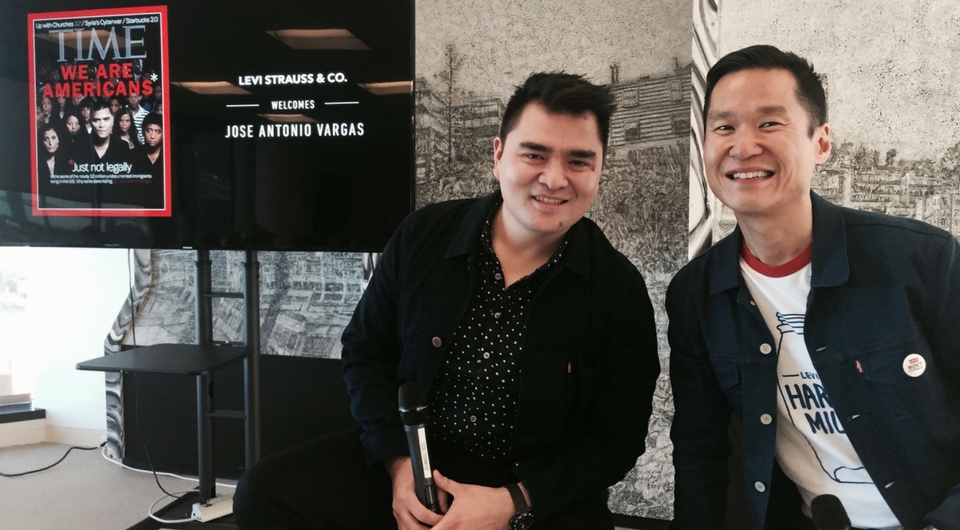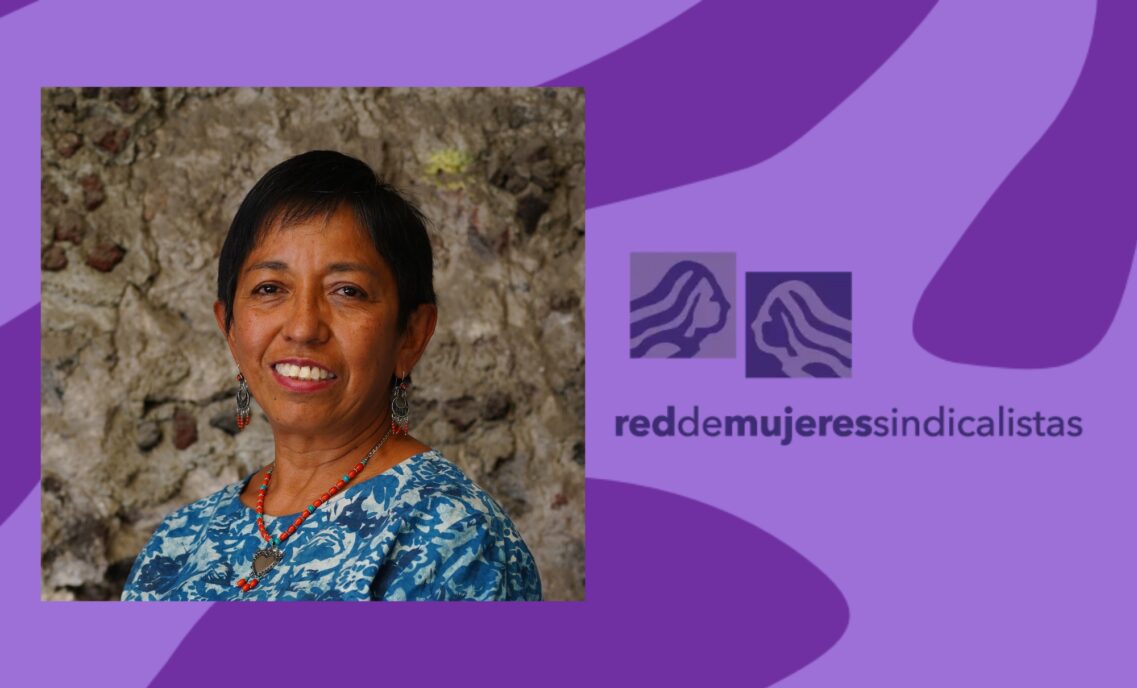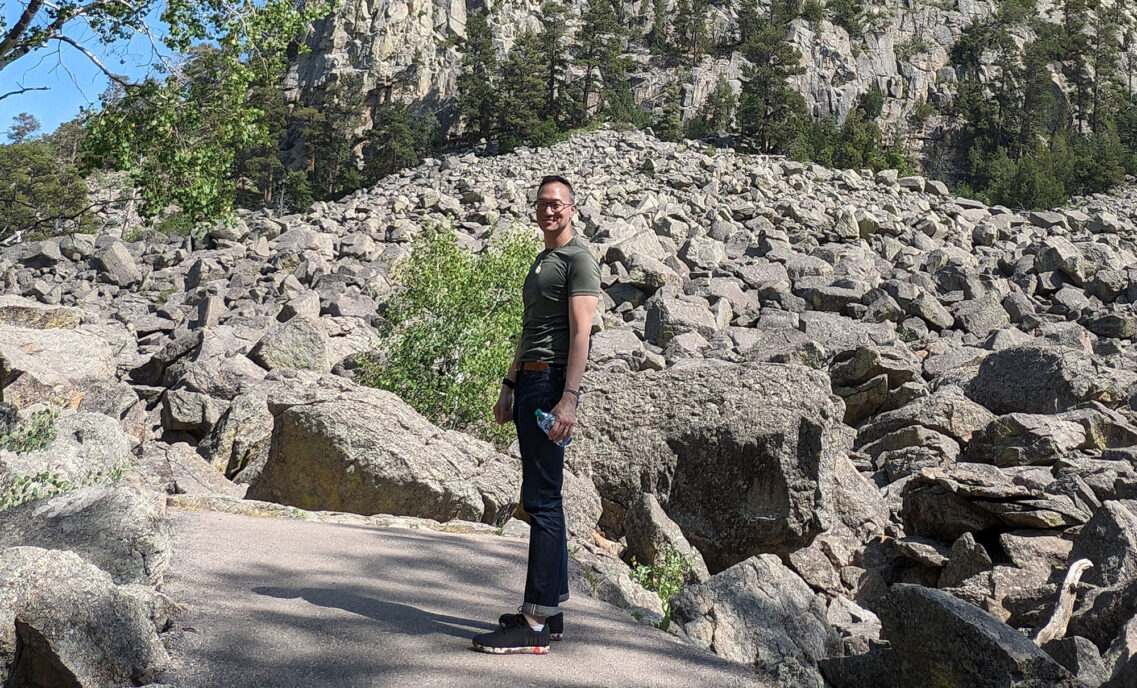Jose Antonio Vargas wants to challenge everything you thought you knew about being an American.
The Pulitzer Prize-winning journalist, filmmaker and activist recently visited Levi Strauss & Co.’s San Francisco headquarters for a provocative discussion on immigration and the changing face of the country.
Jose made headlines in 2011 when he wrote an essay for the New York Times outing himself as an undocumented immigrant, a revelation that offered many a glimpse at the complex personal stories behind the charged rhetoric. He also founded Define American, a nonprofit that harnesses the power of personal stories to challenge the misrepresentations that are rampant in the debate around immigration. The organization urges people to see the faces of the friends, neighbors, classmates and colleagues behind the statistics on undocumented immigrants.
With a polarizing debate on immigration in the national spotlight this year, the conversation with Jose comes at a particularly pivotal time – both for the country, and for Levi Strauss & Co., which has a long history of taking bold stands on a broad range of social issues.
“When you are an American icon, what you say about America matters,” said Levi Strauss Foundation Executive Director Daniel Lee, who led the discussion with Jose. “This is the time to step up, to live our values.”
In keeping with that commitment, the foundation is granting $50,000 to Define American to support its work toward using the power of media and culture to penetrate “beyond the choir” of the immigrant rights movement to reach all Americans, regardless of political affiliation.
The grant honors the myriad ways that Define American’s mission, and Jose’s story specifically, intersect with the long-held LS&Co. values of integrity, courage, originality and empathy.
An undocumented history
Jose came to the United States as a child to live with his grandparents in Mountain View, Calif., and it wasn’t until his teens that he discovered that he didn’t have the proper paperwork.
It was a tough reality he had to come to grips with on a personal level, but he wasn’t ready to divulge publicly. And yet that realization would serve as the driving force behind his career choice.
“I wanted to be a journalist simply so my name could be on a piece of paper. That was literally the only reason,” he said. “I thought, ‘If I can’t be here because I don’t have papers, at least my name would be on the paper.’ It was a way to say that I existed.”
It was also a way for Jose to convey his worth.
“I made a list actually of what it meant to be a good immigrant. I mean I hate that term, but I thought, ‘If I’m going to be a journalist, I have to be a good journalist. Then I made a list, like, ‘Go to The Washington Post, The New York Times; win a Pulitzer… write for The New Yorker because people think it’s a cool thing. Be a political reporter, because I saw the movie ‘Primary Colors.’ And by the time I was 30, I had accomplished all of those things.”
It was a New Yorker interview with Facebook founder Mark Zuckerberg that set him on the path to revealing his secret. The tech executive asked him a casual question about where he was from. That seemingly simple exchange was fraught with a history of secrecy and lies for Jose.
“After he asked me that question is when I really started thinking, ‘I have to stop,’” he said. “I felt like I had been walking on a tightrope my entire life. In many ways, coming out was probably the safest thing I could do for myself. It felt inevitable. It was either someone was going to catch me or I was going to do it myself. Thankfully the right decision was to do it by myself.”
In that 2011 New York Times piece, Jose revealed his immigration status and the story behind it. The award-winning article helped put a face to the estimated 11 million undocumented people who are living in the U.S. today.
A year later, he wrote a follow-up piece for Time about his life after the disclosure, waiting to find out whether he would be deported. On the magazine’s cover, Jose and 35 other undocumented immigrants — from Latin America, Africa, Asia, Europe and everywhere in between — appear under the words “We Are Americans” with an asterisk that adds, “Just not legally.”
Keeping an open conversation
So what does it mean to be American? It’s a question Jose faces regularly.
“People ask me a lot how I define American, and one way for me of defining American is through the very people who have always been excluded from it, because you have to fight for it,” he answers.
“I actually think what’s on the line is the very question of citizenship… I would argue that citizenship is actually something that we earn,” Jose added. “Part of that earning to me is how we bear witness to each other.”
The other component? An open mind.
“How do we become more intentional about making sure that we’re not existing in our silos? I can’t talk to you about immigrant rights and not talk about women’s rights, and not talk about income inequality, and not talk about LGBT rights, and not talk about ‘Black Lives Matter,’” he said. “How do these issues really intersect? Our lives, whether or not you like it, are connected. Our qualities are connected to one another.”
In the wake of this year’s polarizing presidential election, Jose argues that now is the time to have more conversations from a place of what he calls “radical empathy and uncomfortable honesty.”
“How many of you have un-friended people on Facebook after the election?” he asked. “Can you friend them back? I actually think it’s more important that we don’t exist in our own echo chambers; that we have to figure out how to talk to people who don’t agree with us or who don’t share the system of reality that we occupy. More than ever, I think it’s important.”







